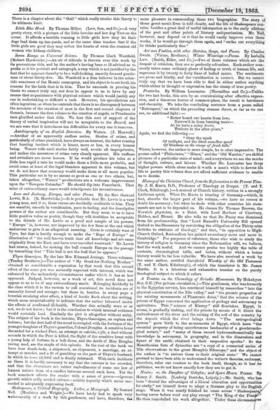Art ana Fashion, with other Sketches, Songs, and Poems. By
Charles Swain. (Virtue, Brothers.) Winter Weavings —Poems. By Isabella Law. (Smith, Elder, and Co.)—Two of those volumes which are the despair of criticism, they are so perfectly colourless. Each author com- monly takes some ordinary phase of feeling or truth of human life, and expresses it by twenty to forty lines of ballad metre. The sentiments are pious and kindly, and the versification is correct. But we cannot truly say that we have been able to find in either author anything which either in thought or expression has the stamp of true poetry.
Proterita. By William Lancaster. (Macmillan and Co.)—Unlike the two last books, this errs by an overstraining after effective expres- sion, and a timorous horror of common-place, the result is harshness and obscurity. We take the concluding sentence from a poem called "Retrospect," on which the preceding stan7,,e throw, so far as we can see, no additional light : —
"Better hoard our hearts from love,
Narrow'd in from burning tears—
At its taste a noisy drove, Traitors in the after-years."
Again, we find the following :—
" Gray the mask Of twilight, and the bleak unmellow speed Of blindness on the visage of fresh hills."
Where, however, the author is more simple, he is often impressive. The poems called "Philoctetes," "Minos," and the "Old Warrior," are skilful pictures of a particular state of mind; and everywhere we see the marks of thought, culture, and labour. Whether Mr. Lancaster has those higher powers which alone make it worth a man's while to devote his life to poetry this volume does not afford sufficient evidence to enable us to decide.


































 Previous page
Previous page